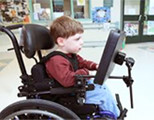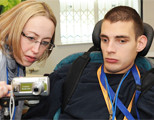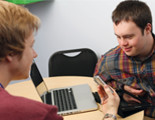Max and Anne Marie
Max is a communicative, happy, fun loving, lovely little boy. Before using his current device, Max had two Go Talk 20 devices (one at home and one at school) but both school and Mum reported how there was not enough vocabulary for him.
Max was assessed when he was five years old by EATS in March 2017 at his school. Max was using gesture, body language, facial expressions and some vocalisations to communicate. Max had no physical difficulties and was able to use his fingers to select cells without difficulty.
An iPad with the Proloquo2Go app set on Intermediate language with 7 x 11 cells was provided in a Griffin survivor case.
When the device was installed, EATS provided hands on training with Max’ Mum and other key individuals to ensure the device would be modelled and used to communicate with Max in order to promote and show its function as Max’ voice.
With positive support Max soon became adept at using the device to communicate using full sentences and to express his humour and personality. Max started vocalising more and then in October he began to speak with his device and in January was beginning to need his device less and less as his verbal communication continued to develop.The first part of the first video of Max was taken by his local SLT in October and the second one was taken by EATS in January and so you can see the development of Max’ speech.
We thought it was important and interesting to also get Max’ Mum’s thoughts about her son and the use of the iPad for a voice and this can be seen on the second video.
If you have any questions you would like to ask us or Max, his Mum or his local SLT, please send them via our email eats.lincoln@nhs.net
A big thank you to Max, his Mum, Emma Lane (Speech and Language Therapist, Derbyshire Community Health Service NHS FoundationTrust) and his school for helping us put together this video and for all the support and work they have all done to embed using his electronic voice every day.
Please note, it is very exciting that Max has learned to speak and that the device has helped him do so; this will not always be the case, particularly if an individual has physical difficulties or other contributing factors.





